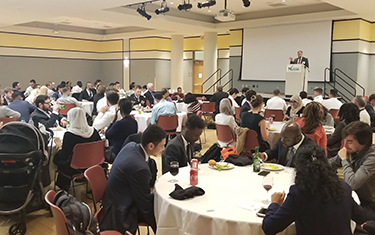"The quality of the papers was outstanding."
— Tom Clemons, an associate professor of Systems Engineering and Operations Research

Mason Engineering students competed recently at the second annual Andrew P. Sage Memorial Systems Engineering Capstone Design Competition.
Four Mason Engineering student teams received awards for their design projects at the second annual Andrew P. Sage Memorial Systems Engineering Capstone Design Competition, hosted by the Department of Systems Engineering and Operations Research (SEOR).
The event, held on the Fairfax Campus on April 29, included 30 student teams from four universities.
"The quality of the papers was outstanding," said technical chair Tom Clemons, an associate professor of Systems Engineering and Operations Research. "The student teams tackled difficult real-world problems and came up with innovative solutions."
The winners in each of the tracks were as follows:
Design engineering: “Radiological and Imagery Data Enhanced Reconnaissance Swarm (RAIDERS)” by Hayden Trainor, Nicole Plhamus, Matilda Brady, United States Military Academy, West Point.
Decision support systems: “Chilled Water System Decision Support System” by Kayla Corey, William Harding, Luke Fritzke, Caitlin Johnson, and Naif Alghunaim, George Mason University.
Social impact: “The Relationship between Instagram Usage, Content Exposure, and Reported Self-Esteem" by Marisa Lockhart, University of Virginia.
Cyber engineering: “A Novel Technique for Identifying Geospatial Image Tampering Using Machine Learning” by Stefany Cando, Ashlyn Gill, John Ailes, and Manil Trivedi, George Mason University.
Transportation engineering: “Northeast Corridor Mass Transportation System Analysis” by Natalee Coffman, Yaovi Kodjo, Jacob Noble and Jaehoon Choi, George Mason University.
System process design: “Design of a Systems Engineering Handbook to Integrate Science Experiments with a ThinSat Payload” by Lena S. Elhajj and Raghad G. Alahmadi, George Mason University.
Judging in each of the tracks was conducted by industry and government representatives from more than 13 local system engineering enterprises.
"The judges had a difficult time selecting a clear winner," says Caroline Abramson, a volunteer judge who works as a system engineer at the MITRE Corporation. "We deliberated for an extended period weighing multiple attributes before we could agree."
The students were encouraged to apply the system engineering V (SE-V) to their problems. The SE-V starts with a context analysis and stakeholder analysis to understand the problem.
"Many times, the project sponsors assign problems that are not supported by the data," says conference co-chair George Donohue, a professor emeritus of SEOR. "It is imperative to collect and analyze the data to make the team is working on a real problem."
To complete the SE-V, the students designed, built prototypes or coded simulations of the design, and tested their designs. Finally, the students developed business plans to establish the economic feasibility of the design.
“The students demonstrated that they are ready to enter the workforce and contribute right away without an apprenticeship period,” says conference co-chair Lance Sherry, an associate professor of systems engineering.
The event honors Andrew P. Sage, the founding dean of the Volgenau School, a pioneer in systems engineering, a prolific author, and a dedicated educator.
“A special thank you to all of the faculty and staff at all the universities that make this happen,” says John Shortle, SEOR professor and chair. "The spirit of the students is so uplifting. We plan to keep running the conference until there are no more problems in the world to solve."
"We plan to keep running the conference until there are no more problems in the world to solve."
— John Shortle, chair of the Department of Systems Engineering and Operations Research
